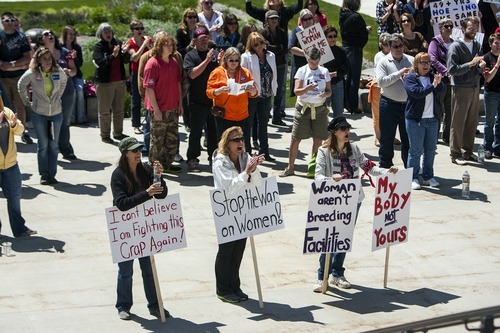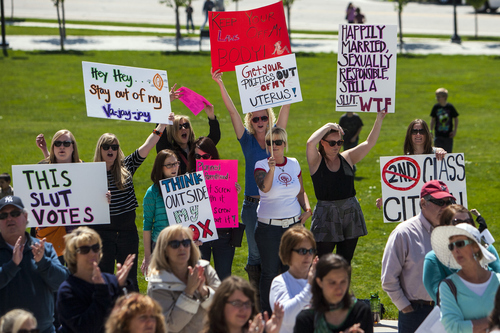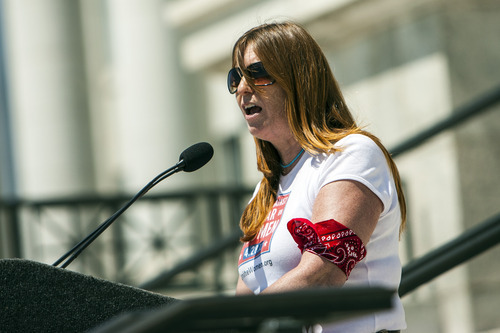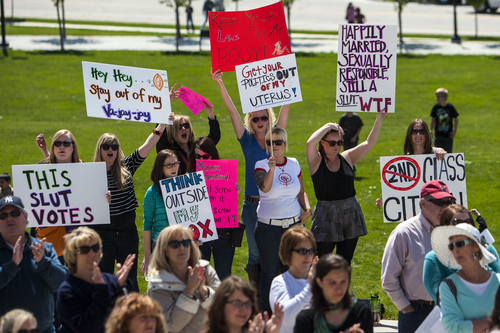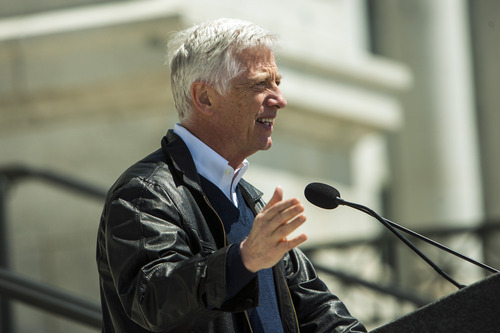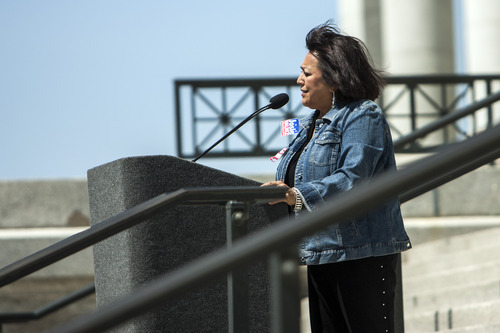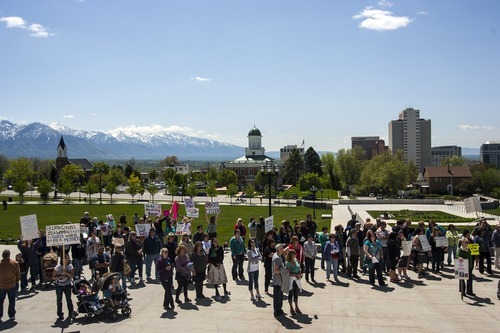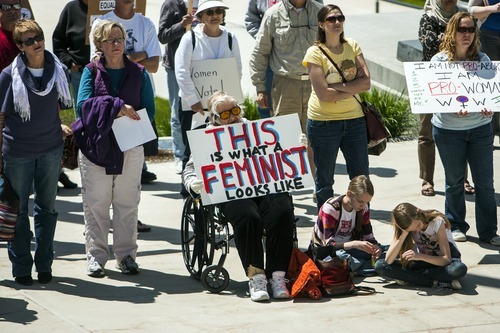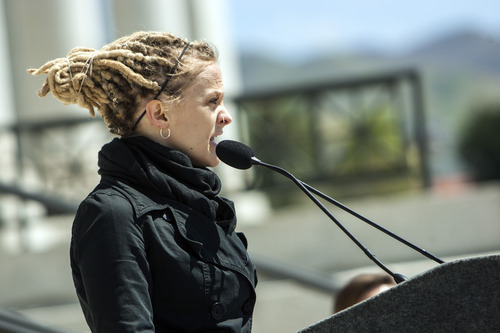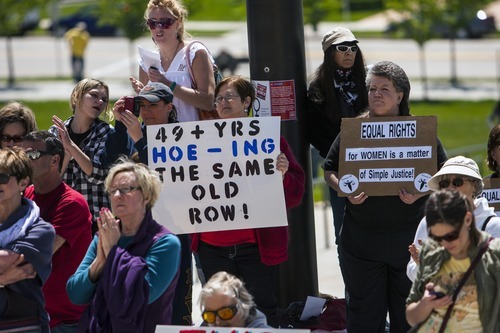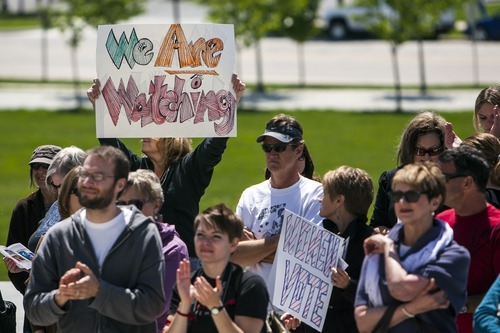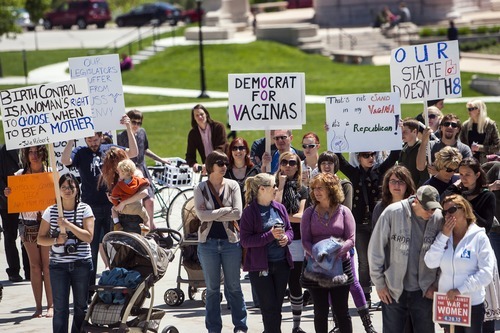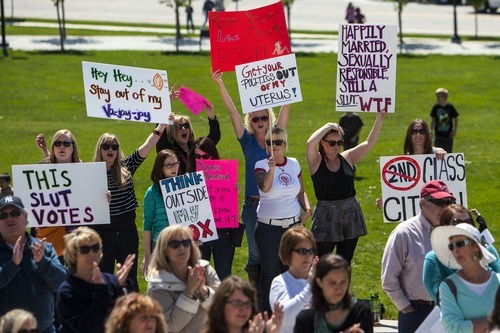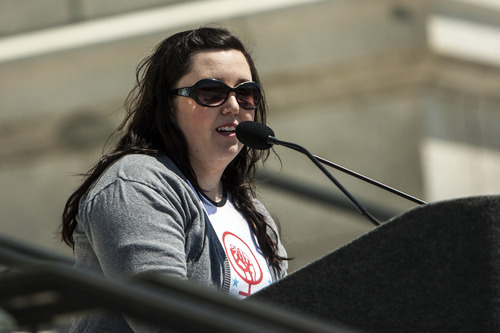This is an archived article that was published on sltrib.com in 2012, and information in the article may be outdated. It is provided only for personal research purposes and may not be reprinted.
Here's the trouble with many of the nation's recent legislative initiatives targeting the "tiny and intimate details" of women's private lives: They are the spawn of male lawmakers rather than the fruits of healthy discourse, according to protesters gathered Saturday at the Utah Capitol to denounce what they say amounts to a "war on women."
The proponents of so-called "personhood" measures and other bills restricting access to reproductive health services never bother to ask female constituents what they think, activists told the few hundred in attendance.
"If you had more women in the legislatures, we wouldn't have these bad laws," said Pete Ashdown, a former Democratic candidate for U.S. Senate, throwing shoutouts to female legislative candidates in the crowd on the Capitol steps. "I believe we can turn this around. We've got to get more women in charge."
One of those women whom the Salt Lake City Internet entrepreneur would put in charge is Billie Gay Larson, president of the Utah Women's Democratic Club.
She accused the Republican Party, the Utah Legislature and the state's congressional delegation of kowtowing to "right-wing fanatics," such as the Eagle Forum, which she called an "American West version of the Taliban."
"This is a militant sect bent on relegating us to Third World status," Larson said. "They want to deny us our equality and basic humanity."
Larson's remarks came as part of a nationwide day of rallies coordinated by the group Unite Women, drawing attention to hundreds of bills introduced in recent months that would impose new restrictions on women's rights or undo past gains.
"These bills being put out are attacks on women, our reproductive rights, rights to equal pay, right to equality, to be protected from violence," said event organizer Sara Librandi. "When it comes to abortion rights, Utah is one of the worst offenders, but in other issues Utah isn't as bad as some of these other states. There seems to be a race to the bottom to see who can have the most extreme laws: Arizona, Mississippi, Oklahoma, even Wisconsin."
In many states, women face prosecution after miscarriages thanks to "personhood" laws, Librandi said.
Critics of the Unite Women movement say its combative rhetoric is overblown. But Heather Stringfellow, policy director with Planned Parenthood, believes the reference to warfare is appropriate.
"An act of war is an act that threatens your sense of peace. It threatens my sense of peace when I'm relegated to the margins and told what I can and cannot do with my own body," said Stringfellow, who shared the podium with Anna Brower, of the American Civil Liberties Union, and former Salt Lake City Mayor Rocky Anderson.
"Women are losing access to health services that should be available to them by virtue of modern medicine and the Constitution," Brower said. "Limiting options does not improve our communities."
Speakers blasted the Utah Legislature's debate-free passage of HB461, which extends the abortion waiting period from 24 to 72 hours, the nation's longest. Gov. Gary Herbert signed the bill last month, framing it as a way to "allow a woman facing such a decision time to fully weigh her options."
Protester Christine Stenquist, who held a sign reading, "Women aren't breeding facilities," outlined the absurdity of forcing a rape victim to wait three days, something that will be required when the measure takes effect May 7. The Kaysville resident was also angered by growing restrictions on contraception.
"Birth control isn't covered by insurance, but Viagra is," Stenquist said.
Anderson, now a presidential candidate with the new Justice Party, tied such measures to a broader "undoing of the American dream of equality and justice."
"Our nation is seeing a dangerous onslaught of bigoted extremist policies," said Anderson, who drew heckles when his speech veered into drone attacks and other things he doesn't like about U.S. foreign policy. "We have to remain diligent and make sure these politicians pay a political price."


